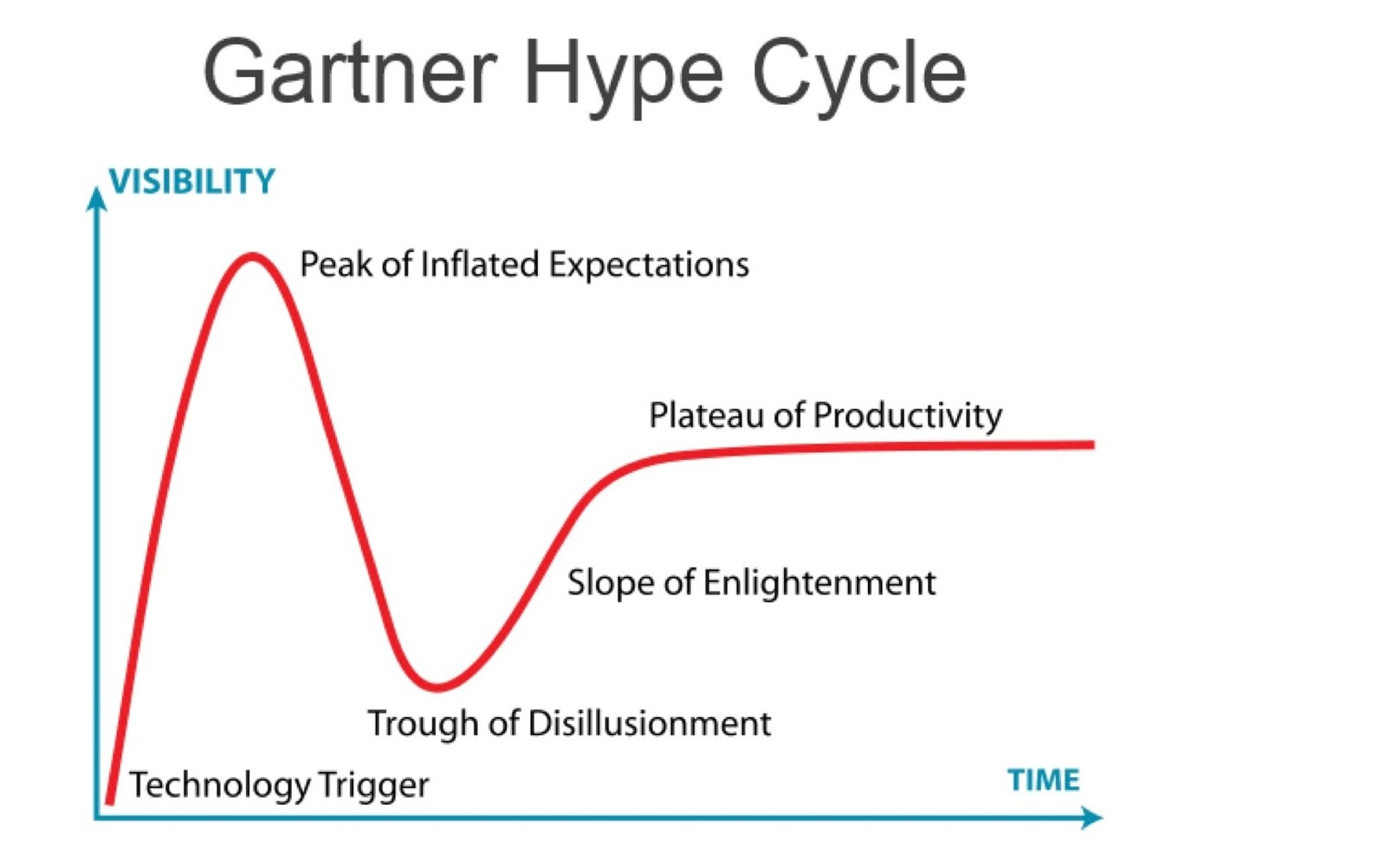Useful for scammers and spam
So if I were to get this straight, the entire logic is that due to big hype, it fits the pattern or other techs becoming useful… that’s sooo not a guarantee, so many big hype stuff have died.
NFTs anyone?
No thanks, I filled up on Dogecoin before dinner.
LLMs need to get better at saying “I don’t know.” I would rather an LLM admit that it doesn’t know the answer instead of making up a bunch of bullshit and trying to convince me that it knows what it’s talking about.
if(lying)
don’t();
LLMs don’t “know” anything. The true things they say are just as much bullshit as the falsehoods.
I hate to break this to everyone who thinks that “AI” (LLM) is some sort of actual approximation of intelligence, but in reality, it’s just a fucking fancy ass parrot.
Our current “AI” doesn’t understand anything or have context, it’s just really good at guessing how to say what we want it to say… essentially in the same way that a parrot says “Polly wanna cracker.”
A parrot “talking to you” doesn’t know that Polly refers to itself or that a cracker is a specific type of food you are describing to it. If you were to ask it, “which hand was holding the cracker…?” it wouldn’t be able to answer the question… because it doesn’t fucking know what a hand is… or even the concept of playing a game or what a “question” even is.
It just knows that it makes it mouth, go “blah blah blah” in a very specific way, a human is more likely to give it a tasty treat… so it mushes its mouth parts around until its squawk becomes a sound that will elicit such a reward from the human in front of it… which is similar to how LLM “training models” work.
Oversimplification, but that’s basically it… a trillion-dollar power-grid-straining parrot.
And just like a parrot - the concept of “I don’t know” isn’t a thing it comprehends… because it’s a dumb fucking parrot.
The only thing the tech is good at… is mimicking.
It can “trace the lines” of any existing artist in history, and even blend their works, which is indeed how artists learn initially… but an LLM has nothing that can “inspire” it to create the art… because it’s just tracing the lines like a child would their favorite comic book character. That’s not art. It’s mimicry.
It can be used to transform your own voice to make you sound like most celebrities almost perfectly… it can make the mouth noises, but has no idea what it’s actually saying… like the parrot.
You get it?
LLMs are just that - Ms, that is to say, models. And trite as it is to say - “all models are wrong, some models are useful”. We certainly shouldn’t expect LLMs to do things that they cannot do (i.e. possess knowledge), but it’s clear that they can do other things surprisingly effectively, particularly providing coding support to developers. Whether they do enough to warrant their energy/other costs remains to be seen.
Get the average human to admit they were wrong, and LLMs will follow suit
Scientist have developed just that recently. There was a paper about that. It’s not implemented in commercial models yet
Knowing the limits of your knowledge can itself require an advanced level of knowledge.
Sure, you can easily tell about some things, like if you know how to do brain surgery or if you can identify the colour red.
But what about the things you think you know but are wrong about?
Maybe your information is outdated, like you think you know who the leader of a country is but aren’t aware that there was just an election.
Or maybe you were taught it one way in school but it was oversimplified to the point of being inaccurate (like thinking you can do physics calculations but end up treating everything as frictionless spheres in gravityless space because you didn’t take the follow up class where the first thing they said was “take everything they taught you last year and throw it out”).
Or maybe the area has since developed beyond what you thought were the limits. Like if someone wonders if they can hook their phone up to a monitor and another person takes one look at the phone and says, “it’s impossible without a VGA port”.
Or maybe applying knowledge from one thing to another due to a misunderstanding. Like overhearing a mathematician correcting a colleague that said “matrixes” with “matrices” and then telling people they should watch the Matrices movies.
Now consider that not are AIs subject to these things themselves, but the information they are trained on is also subject to them and their training set may or may not be curated for that. And the sheer amount of data LLMs are trained on makes me think it would be difficult to even try to curate all that.
I work on LLM’s for a big tech company. The misinformation on Lemmy is at best slightly disingenuous, and at worst people parroting falsehoods without knowing the facts. For that reason, take everything (even what I say) with a huge pinch of salt.
LLM’s do NOT just parrot back falsehoods, otherwise the “best” model would just be the “best” data in the best fit. The best way to think about a LLM is as a huge conductor of data AND guiding expert services. The content is derived from trained data, but it will also hit hundreds of different services to get context, find real-time info, disambiguate, etc. A huge part of LLM work is getting your models to basically say “this feels right, but I need to find out more to be correct”.
With that said, I think you’re 100% right. Sadly, and I think I can speak for many companies here, knowing that you’re right is hard to get right, and LLM’s are probably right a lot in instances where the confidence in an answer is low. I would rather a LLM say “I can’t verify this, but here is my best guess” or “here’s a possible answer, let me go away and check”.
It’s an interesting point. If I need to confirm that I’m right about something I will usually go to the internet, but I’m still at the behest of my reading comprehension skills. These are perfectly good, but the more arcane the topic, and the more obtuse the language used in whatever resource I consult, the more likely I am to make a mistake. The resource I choose also has a dramatic impact - e.g. if it’s the Daily Mail vs the Encyclopaedia Britannica. I might be able to identify bias, but I also might not, especially if it conforms to my own. We expect a lot of LLMs that we cannot reliably do ourselves.
I thought the tuning procedures, such as RLHF, kind of messes up the probabilities, so you can’t really tell how confident the model is in the output (and I’m not sure how accurate these probabilities were in the first place)?
Also, it seems, at a certain point, the more context the models are given, the less accurate the output. A few times, I asked ChatGPT something, and it used its browsing functionality to look it up, and it was still wrong even though the sources were correct. But, when I disabled “browsing” so it would just use its internal model, it was correct.
It doesn’t seem there are too many expert services tied to ChatGPT (I’m just using this as an example, because that’s the one I use). There’s obviously some kind of guardrail system for “safety,” there’s a search/browsing system (it shows you when it uses this), and there’s a python interpreter. Of course, OpenAI is now very closed, so they may be hiding that it’s using expert services (beyond the “experts” in the MOE model their speculated to be using).

Where are we on this? No way we’re at the bottom of the trough yet.
Well, how disappointed are you feeling, personally?
Do you see your negative opinions of generative AI becoming more intense, or deeper within the next 6-12 months, or have they hit a plateau of sustained disappointment mediated by the prior 6-12 months?
Going down to disillusionment two months ago.
This human reaction to a lot of stuff. It’s interesting how it looks like a PID loop. https://theautomization.com/pid-control-basics-in-detail-part-2/
Is it me or is there something very facile and dull about Gartner charts? Thinking especially about the “””magic””” quadrants one (wow, you ranked competitors in some area along TWO axes!), but even this chart feels like such a mundane observation that it seems like frankly undeserved advertising for Gartner, again, given how little it actually says.
And it isn’t even true in many cases. For example the internet with the dotcom bubble. It actually became much bigger and important than anyone anticipated in the 90s.
It’s also false in the other direction: NFTs never got a “Plateau of Productivity”.
A lot of tech hype are just convoluted scams or ponzi schemes.
fascinating. Thank you.
We should’ve known this fact, when we still have those input prompt voice operators that still can’t for the life of it, understand some of the shit we tell it. That’s the direction I saw this whole AI thing going and had a hunch that it was going to plummet because the big new shiny tech isn’t all that it was cracked up to be.
To call it ‘ending’ though is a stretch. No, it’ll be improved in time and it’ll come back when it’s more efficient. We’re only seeing the fundamental failures of expectancy vs reality in the current state. It’s too early to truly call it.
That’s a good comparison.
Note though that input prompt voices have not revolutionized anything. I personally avoid them as much as possible.
It’s on the falling edge of the hype curve. It’s quite expected, and you’re right about where it’s headed. It can’t do everything people want/expect but it can do some things really well. It’ll find its niche and people will continue to refine it and find new uses, but it’ll never be the threat/boon folks have been expecting.
People are using it for things it’s not good at thinking it’ll get better. And it has to an extent. It is technically very capable of writing prose or drawing pictures, but it lacks any semblance of artistry and it always will. I’ve seen trained elephants paint pictures, but they are interesting for the novelty, not for their expression. AI could be the impetus for more people to notice art and what makes good art special.
To call it ‘ending’ though is a stretch.
That’s only the title and it is only referring to the hype ending, not development of the technology:
Eighteen months later, generative AI is not transforming business. Many projects using the technology are being cancelled, such as an attempt by McDonald’s to automate drive-through ordering which went viral on TikTok after producing comical failures. Government efforts to make systems to summarise public submissions and calculate welfare entitlements have met the same fate.
If you read the article you’ll find the author is not claiming we have universally reached the end of AI or its hype cycle yet:
A Gartner report published in June listed most generative AI technologies as either at the peak of inflated expectations or still going upward.
There’s a whole section of the article dedicated to answering why this is the case, too. I recommended you read the article, as you seem to have misinterpreted it based on the title.
hot take: chatbots are actually kinda useful for problem solving but its not the best at it
Useful in the way that it increases emissions and hopefully leads to our demise because that’s what we deserve for this stupid technology.
Surely this is better than the crypto/NFT tech fad. At least there is some output from the generative AI that could be beneficial to the whole of humankind rather than lining a few people’s pockets?
I’m crypto neutral.
But it’s really strange how anti-crypto ideologues don’t understand that the system of states printing money is literally destroying the planet. They can’t see the value of a free, fair, decentralized, automatable, accounting systems?
Somehow delusional chatbots wasting energy and resources are more worthwhile?
Printing currency isn’t destroying the planet…the current economic system is doing that, which is the same economic system that birthed crypto.
Governments issuing currency goes back to a time long before our current consumption at all cost economic system was a thing.
You are right, crypto has nothing to do with currency printing. And yes, the environmental side too is a problem (unless it is produced inline with recycled energy) But governments issuing currency is a relatively recent phenomenon. Historically, people traded de facto currencies and IOUs amongst themselves.
Bitcoin was conceived out of the 2008 financial crisis, as a direct response to big banks being bailed out. It’s literally written in Bitcoin’s Genesis block. The point of Bitcoin has always been to free people from the tyranny of big government AND big capital.
Crypto isn’t that popular in developed countries with functioning monetary systems… untill of course those big institutions fail. I am still quite surprised, this side of Bitcoin is rarely discussed on Lemmy, given how anticapitalist it is.
I get it libertarian, bad. And to some degree, there are a lot of problems there. But the extreme opposite ain’t that rosy either.
Are you really using all of human history as a timeframe to say that currency is a relatively recent phenomenon?
Again, I’m not anti-cryptocurrency, but it’s not really a currency anymore than any other commodity in a commodity exchange, or a barter market.
And I don’t care if it’s livestock, or Bitcoin, I’m not accepting either as payment if I sell my home, or car. Not because of principles, but because I don’t know how to convert livestock into cash, and I can’t risk the Bitcoin payment halving in value before I can convert it to cash.
And who was talking extremes? I’m just pointing out the absurdity of the claims that crypto is the replacement for, or salvation from, our current economic system, or the delusion that currency backed by a nation is somehow just as ephemeral as Bitcoin, or ERC20 rug pulls.
You said Bitcoin was designed to free us from the tyranny of big capital, but it’s been entirely co-opted by the same boogeyman. So regardless of the intentionality behind the project, it’s now just another speculative asset.
Except, unlike gold or futures contracts, there’s no tangible real world asset, but there is a hell of a real cost.
I think it’s because of what crypto turned into and the inherent flaws in the system. Crypto currencies are still backed by and dependent on traditional currency, and their value is too unstable for the average person. The largest proponents of crypto have been corporations - big capital, as you put it - and there’s a reason for that (though they’re more on the speculative market of NFTs looking to make a profit off of Ponzi schemes).
In the end, crypto hasn’t solved any problems that weren’t already solved by less energy intensive means.
I’m fine doing away with physical dollars printed on paper and coins but crypto seems to solve none of the problems that we have with a fiat currency but instead continues to consume unnecessary amounts of energy while being driven by rich investors that would love nothing more than to spend and earn money in an untraceable way.
Unfortunately crypto is still somehow a thing. There is a couple year old bitcoin mining facility in my small town that brags about consuming 400MW of power to operate and they are solely owned by a Chinese company.
I recently noticed a number of bitcoin ATMs that have cropped up where I live - mostly at gas stations and the like. I am a little concerned by it.
Do you really think that paper money covered in colonizers and other slavermasters is going to last forever?
Found the diamond hands.
Crypto currencies are still backed by and dependent on those same currencies. And their value is incredibly unstable, making them largely useless except as a speculative investment for stock market daytraders. BitCoin may as well be Doge Coin or Bored Ape NFTs as far as the common person is concerned.
I hope your coins haven’t seen a 90%+ drop in value in the past 4 years like the vast majority have.
What do you mean by “backed” here? I think I’m misunderstanding but I thought (and a short google seems to confirm) that currency A being backed by currency B means the value of A is fixed at a certain amount of currency B, and there is some organisation “backing” this with reserves.
Not trying to shill/defend crypto, just confused on terminology :)
I mean that crypto currencies are essentially the same as stocks. They have no worth on their own, and their value is tied to converting them to other currencies.
And this conversion rate fluctuates constantly. What one bitcoin is worth today is not what it will be worth tomorrow. In order to buy something with a crypto currency, companies have to first check how much it’s worth in fiat currency.
That’s why you stick with Bitcoin instead of running after whatever flashy new super duper coin that assholes trick fools into buying.
Bullets and toilet paper will be more usable currency than crypto if paper falls out of favor.
I hope this is sarcasm.
lol
Forever? No, of course not.
But paper currency is backed by a nation state, so I’m betting it’ll be around a bit longer then a purely digital speculative asset without the backing of a nation, and driven entirely by speculation.
I’m not even anti-crypto. It was novel idea when it was actually used entirely as a currency, but that hasn’t been true for quite some time.
It takes living with a broken system to understand the fix for it. There are millions of people who have been saved by Bitcoin and the freedom that it brings, they are just mainly in the 2nd and 3rd worlds, so to many people they basically don’t exist.
That’s great and all but doesn’t sound like a valid excuse for the excessive amount of energy it consumes. It’s also hard for me to imagine 3rd world places that somehow flourish because of a currency that needs the Internet to exist.
I just looked it up, it looks like it is the a difference of 35% to 80% in the developed world.
Imagine this, you are forced to hold your wealth in corrupt government run banks. They often print tons of it for themselves, criminals are printing it, the government can seize it from anyone they want. You can try to store it at home, yourself, or you can give it to the banks. Now there is a third option, store it as Bitcoin. No need for risking it under your bed or with the corrupt banker politicians, and on top of those be victims to their inflation. Sure, your bank probably doesn’t often seize your money, and your currency probably isn’t rapidly devaluing even compared to the dollar, but if it was then you would probably think the energy is worth it.
But crypto also suffers from crashes and being devalued and if you’re buying Bitcoin with your hard earned dollar that is worth less and less then you are ultimately buying less and less Bitcoin. The fact that Bitcoin still needs all of the other currency to function as a middle man makes it vulnerable to the same risks. Maybe it helps people in niche situations but I’m sure we’ll all be thinking it’s worth it when those same struggling places are the hardest hit by climate change. At least they’ll have a bunch of digital currency propped up by fiat currency.
Climate change is a separate issue.
It would be fantastic if people being abused by corrupt politicians and currencies was niche! It’s not though, there are hundreds of millions of people struggling with it. Billions depending on how you count it. It is a disease of the 1st world to be unable to accept that not everyone has the same privileges they enjoy. Human beings are literally starving to death and dying decades early due to poverty, Bitcoin is literally keeping them alive. Spoiled brats want them to die because they saw a headline that tells them to parrot that Bitcoin is bad. Where is your outrage over Christmas lights? How about video games? These things don’t save lives and transform existences like safe money does.
Nearly everyone who has bought Bitcoin and held are up, it has outperformed every stock, every currency, every investment on large enough time scales. Give me a volatile currency that goes up in value over volatile currencies that utterly collapse. Where is the outrage over the lira? Or any other currency that is down to 5% of itself that people are “supposed” to hold according to you?
There is a very good reason that you don’t have answers to these. It is because all you know on the issue is that you are not supposed to look to deeply and you’re supposed to mindlessly repeat that Bitcoin is bad without having any idea why. You are allowed to research, you are allowed to make your own decisions, you are allowed to talk to people in the 2nd and 3ed worlds. You are allowed to travel to these places and talk to people. Nobody forces you to repeat their BS, you just have to decide that you want to learn and then put in some effort.
While the consumption for AI train can be large, there are arguments to be made for its net effect in the long run.
The article’s last section gives a few examples that are interesting to me from an environmental perspective. Using smaller problem-specific models can have a large effect in reducing AI emissions, since their relation to model size is not linear. AI assistance can indeed increase worker productivity, which does not necessarily decrease emissions but we have to keep in mind that our bodies are pretty inefficient meat bags. Last but not least, AI literacy can lead to better legislation and regulation.
The argument that our bodies are inefficient meat bags doesn’t make sense. AI isn’t replacing the inefficient meat bag unless I’m unaware of an AI killing people off and so far I’ve yet to see AI make any meaningful dent in overall emissions or research. A chatgpt query can use 10x more power than a regular Google search and there is no chance the result is 10x more useful. AI feels more like it’s adding to the enshittification of the internet and because of its energy use the enshittification of our planet. IMO if these companies can’t afford to build renewables to support their use then they can fuck off.
Using smaller problem-specific models can have a large effect in reducing AI emissions
Sure, if you consider anything at all to be “AI”. I’m pretty sure my spellchecker is relatively efficient.
AI literacy can lead to better legislation and regulation.
What do I need to read about my spellchecker? What legislation and regulation does it need?
Theoretically we could slow down training and coast on fine-tuning existing models. Once the AI’s trained they don’t take that much energy to run.
Everyone was racing towards “bigger is better” because it worked up to GPT4, but word on the street is that raw training is giving diminishing returns so the massive spending on compute is just a waste now.
Issue is, we’re reaching the limits of what GPT technologies can do, so we have to retrain them for the new ones, and currently available data have been already poisoned by AI generated garbage, which will make the adaptation of new technologies harder.
Most of the “might actually become useful” is coming from “okay, this technology won’t bring us a JARVIS-like AI assistant, what can it actually do?”. This is all, while it has one of the worst public images of all technologies that doesn’t invole it being a weapon: it’s main users being the far-right and anyone else that thinks artists are “born with their talent”, thus can do it as a “weekend hobby” while working at least one full-time job (preferably one that involves work injuries and getting dirty, because the same people like to fetishize those), if they’re not outright hostile against the concept of art creation which they simplify to “what if” types of ideas.
To be fair, it is useful in some regards.
I’m not a huge fan of Amazon, but last time I had an issue with a parcel it was sorted out insanely fast by the AI assistant on the website.
Within literally 2 minutes I’d had a refund confirmed. No waiting for people to eventually pick up the phone after 40 minutes. No misunderstanding or annoying questions. The moment I pressed send on my message it instantly started formulating a reply.
The truncated version went:
“Hey I meant to get [x] delivery, but it hasn’t arrived. Can I get a refund?”
“Sure, your money will go back into [y] account in a few days. If the parcel turns up in the meantime, you can send it back by dropping it off at [z]”
Done. Absolutely painless.
That has nothing to do with AI and is strictly a return policy matter. You can get a return in less than 2 minutes by speaking to a human at Home Depot.
Businesses choose to either prioritize customer experience, or not.
There’s a big claim from Klarna - that I am not aware has been independently verified – that customers prefer their bot.
The cynic might say they were probably undertraining a skeleton crew of underpaid support reps. More optimistically, perhaps so many support inquiries are so simple that responding to them with a technology that can type a million words per minute should obviously be likely to increase customer satisfaction.
Personally, I’m happy with environmentally-acceptable and efficient technologies that respect consumers… assuming they are deployed in a world with robust social safety nets like universal basic income. Heh
You can just go to the order and click like 2 buttons. Chat is for when a situation is abnormal, and I promise you their bot doesn’t know how to address anything like that.
We can! We also know how to use web search, read an FAQ, interpret posted policies…
Some folks can’t find buttons under “My Account” but can find the chat box in the corner.
Also I suspect traditionally, you’ve been able to protect features from [ab]use by making them accessible to agents. Someone who would click a “request refund” button may not be willing to ask for a refund. I wonder how this will change as chatbots are popularized.
So how “intelligent” do you think the amazon returns bot is? Gerbil level or human level or beyond? Has it given you any useful life advice or anything?
Doesn’t need to be “intelligent”, it needs to be fit for purpose, and it clearly is.
The closest comparison you made was to the cyoa book, but that’s only for the part where it gives me options. It has to have the “intelligence” to decipher what I’m asking it and then give me the options.
The fact it can do that faster and more efficiently than a human is exactly what I’d expect from it. Things don’t have to be groundbreaking to be useful.
How is a chatbot here better, faster, or more accurate than just a “return this” button on a web page? Chat bots like that take 10x the programming effort and actively make the user experience worse.
Presumably there could be nuance to the situation that the chat bot is able to convey?
But that nuance is probably limited to a paragraph or two of text. There’s nothing the chatbot knows about the returns process at a specific company that isn’t contained in that paragraph. The question is just whether that paragraph is shown directly to the user, or if it’s filtered through an LLM first. The only thing I can think of is that chatbot might be able to rephrase things for confused users and help stop users from ignoring the instructions and going straight to human support.
Like a comment field on a web form?
And it could hallucinate, so you would need to add further validation after the fact
Third, we see a strong focus on providing AI literacy training and educating the workforce on how AI works, its potentials and limitations, and best practices for ethical AI use. We are likely to have to learn (and re-learn) how to use different AI technologies for years to come.
Useful?!? This is a total waste of time, energy, and resources for worthless chatbots.
We should be using AI to pump the web with nonsense content that later AI will be trained on as an act of sabotage. I understand this is happening organically; that’s great and will make it impossible to just filter out AI content and still get the amount of data they need.
Meanwhile, in the real world, generative A.I. continues to improve at an exponential rate.










